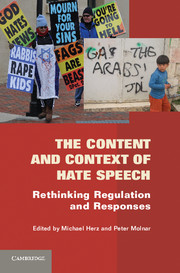Book contents
- Frontmatter
- Contents
- Contributors
- Foreword: Hate Speech and the Coming Death of the International Standard before It Was Born (Complaints of a Watchdog)
- Foreword: Hate Speech and Common Sense
- Acknowledgments
- Introduction
- Part I Overviews
- 1 Interview with Robert Post
- 2 Is There a Case for Banning Hate Speech?
- 3 Hate Speech
- 4 Interview with Kenan Malik
- 5 Hate Speech and the Demos
- 6 On American Hate Speech Law
- Part II Refinements and Distinctions
- Part III Equality and Fear
- Part IV International Law
- Index
- References
5 - Hate Speech and the Demos
Published online by Cambridge University Press: 05 June 2012
- Frontmatter
- Contents
- Contributors
- Foreword: Hate Speech and the Coming Death of the International Standard before It Was Born (Complaints of a Watchdog)
- Foreword: Hate Speech and Common Sense
- Acknowledgments
- Introduction
- Part I Overviews
- 1 Interview with Robert Post
- 2 Is There a Case for Banning Hate Speech?
- 3 Hate Speech
- 4 Interview with Kenan Malik
- 5 Hate Speech and the Demos
- 6 On American Hate Speech Law
- Part II Refinements and Distinctions
- Part III Equality and Fear
- Part IV International Law
- Index
- References
Summary
It is sometimes said that the statist and aristocratic traditions of Europe render its political institutions less democratic than those of the United States. Richard Posner writes of “the less democratic cast of European politics, as a result of which elite opinion is more likely to override public opinion than it is in the United States.” If that is true, then there are obvious ways in which it figures into debates over the wisdom of hate-speech regulation. The standard European argument in favor of such regulation may easily be characterized as antidemocratic: Restrictions on hate speech protect unpopular minority groups from democracy run amok. The Nazi example states the paradigm case, even if the paradigm no longer describes the usual targets of such regulation. By contrast, the American argument against hate-speech regulation is typically framed in democratic terms: Informed deliberation requires that all sides have an opportunity to be heard, with the most able policies emerging through a form of intellectual competition. Or, more interestingly, full participation in a democratic community requires that self-expression not be limited to what others have deemed orthodox.
There is another way, however, in which the relatively democratic character of American politics influences – or rather, should influence – the debate over regulation of offensive speech. Scholars of U.S. constitutional law have increasingly recognized that constitutional argument must not simply appeal to democratic norms but must also attend to democratic conditions. Constitutional law is not fashioned through Socratic argument among scholars and judges, nor does it follow merely from the currents of elite opinion, but it results rather from a dialogue between political institutions – including the Supreme Court – and social and political movements, against a background of often exogenous cultural conditions. Thus, we should understand Brown v. Board of Education not as an epiphany inspired by the force of Earl Warren's charisma or Felix Frankfurter's intellect but as a piece of a movement strategy led by the National Association for the Advancement of Colored People (NAACP) and enabled, in part, by antipathy toward fascism and Stalin's Soviet Union. Changes in U.S. sex-equality law in the 1970s can be tied directly to the sexual revolution of the 1960s and the political forces behind the Equal Rights Amendment.
- Type
- Chapter
- Information
- The Content and Context of Hate SpeechRethinking Regulation and Responses, pp. 92 - 115Publisher: Cambridge University PressPrint publication year: 2012
References
- 4
- Cited by

